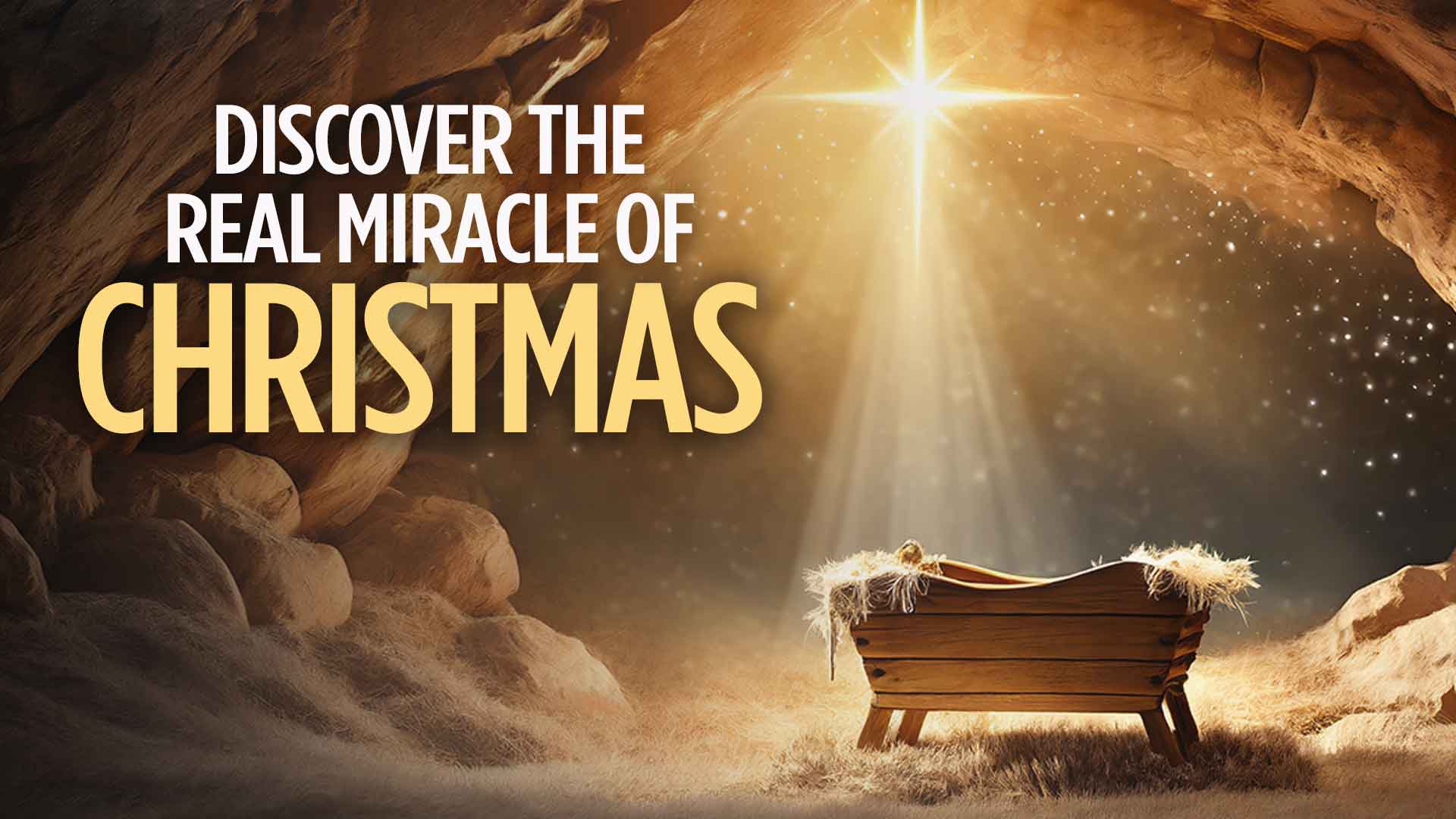

“The Miracle on 34th Street” is still one of the most popular early cinematic Christmas greats. First released in 1947 with a remake in 1995, it’s a story revolving around belief in Santa Clause. It’s one of those movies akin to “It’s a Wonderful Life” or “A Christmas Story” that makes us feel nostalgic and provides a sense of warmth and sweetness wrapped in a religious glow; in the end of each movie, “all is right with the world,” a quote from closing narration in “A Christmas Story.” Perhaps the most famous quote from “The Miracle on 34th Street,” is this: “Faith is believing things when common sense tells you not to.”
Many people celebrate Christmas this way. The nativity scene on the mantle—or maybe it’s been relegated to a small side table—is looked on with nostalgia as if silently asking, “Awwwww, isn’t this a sweet story about a straw-filled manger, a little baby, and a bright star?” People look on the scene as if it’s merely about history or perhaps fantasy. To them, real faith in the real miracle of Christmas, Jesus Christ, is as far beyond the pale of reason as is faith in a jolly round elf coming down the chimney.
But there is so much substantial evidence for the miracle of Christmas that disbelief defies reason. And it is this evidence that gives us bright hope in a dimly lit world.
Jesus is the Miracle on your street. He is THE Wonderful Life. He is THE Christmas Story.
Let’s take a look first at some of the characters in the story of Christmas in Luke 2. Then we’ll look at the birth of salvation, cover a few of the Old Testament Messianic prophecies, Jesus fulfilled, observe the Trinity in the miracle of Christmas, then camp on the attributes of the Messiah, Jesus of Nazareth, who came to us through the miracle of the Virgin Birth.
Now after Jesus was born in Bethlehem of Judea in the days of Herod the king, behold, wise men from the East came to Jerusalem, saying, “Where is He who has been born King of the Jews? For we have seen His star in the East and have come to worship Him” (Matthew 2:1-2).
The Magi who came from the East probably had anticipated the coming of a great king their entire lives. These were learned men, the great scholars of their day, who most likely belonged to the group of advisers to the kings of Babylon and Persia. The kings called upon them to solve difficult mysteries, riddles, or dreams. The Old Testament prophet, Daniel, belonged to this group and likely told his contemporaries about the promised Messiah. They would have been studying history and studying astronomy, and looking at the skies most of their lives to notice the new star God had provided and to understand its meaning.
After the star appeared, we know from the story in Matthew 2:1-12 that it may have taken about two years for the Magi to travel from the East to Jerusalem, searching for the young king. They told Herod when the star had appeared, Herod’s advisors confirmed Bethlehem as the prophesied location of the Messiah’s birth, and the Magi found the young child (no longer a baby) with His mother Mary. They brought treasures fit for a king (gold), a priest (frankincense), and one who would be sacrificed (myrrh). Their life-long quest accomplished, they made the long journey back home. These men were from afar. They had no stake in the politics of the region. Their appointment in Bethlehem was divinely scheduled; their search for the King was diligent because they were divinely compelled.
We, too, must seek the King with steadfast dedication. It is ironic, but during the Christmas season, the time we as Christians should celebrate His coming and worship Him for His eternal beauty, we often bury our desire for Him under the weight of our holiday traditions, expectations, and activities.
We need to diligently seek our King in prayer and in His Word no less at Christmas than at any other time—and perhaps more! Otherwise, we may let our activity destroy our testimony as others watch us stress over the celebration of the very One we praise.
Read the story of the Wise Men in Matthew 2:1-12.
Now there were in the same country shepherds living out in the fields, keeping watch over their flock by night (Luke 2:8).
The Magi were wealthy men who brought expensive gifts, but they were not the first to visit the Son of God at His birth. God reserved that privilege for lowly shepherds. When we understand that these were the very shepherds who watched over the special flocks from which the most perfect lambs were set apart for sacrifice during the Passover celebration, we can make an educated guess as to why the privilege was granted. The shepherds slept in the fields with their flocks. Jesus of Nazareth had “no place to lay His head” during His ministry. The shepherds were lower-class citizens. Jesus was from a poor family; He was despised and rejected. The shepherds understood sacrifice; Jesus, the lamb of God, became sacrifice.
How about you? Rich or poor, young or old, healthy or ailing, will you do what the shepherds did?
Now when they had seen Him, they made widely known the saying which was told them concerning this Child. And all those who heard it marveled at those things which were told them by the shepherds (Luke 2:17-18).
Get “The Secret of Satisfaction,” based on the beloved Psalm 23, and find out why Jesus alone qualifies as the Good Shepherd.
When Jesus’ earthly father, Joseph, and His mother, Mary, took Him to the temple for the first time, an old man by the name of Simeon, “who had been waiting for the consolation of Israel,” took the infant Son of God in His arms, blessing Him and worshiping Him at the same time as He called out:
“Lord, now You are letting Your servant depart in peace, according to Your word; for my eyes have seen Your salvation which You have prepared before the face of all peoples, a light to bring revelation to the Gentiles, and the glory of Your people Israel” (Luke 2:29-32).
An elderly prophetess (Scripture says she was about 84 years old), also present, had been widowed at a young age. Scripture says she “did not depart from the temple, but served God with fastings and prayers night and day” (Luke 2:37b). She too worshiped God; like the shepherds, she witnessed what she Had seen.
And coming in that instant she gave thanks to the Lord, and spoke of Him to all those who looked for redemption in Jerusalem (Luke 2:38).
God gave these two faithful servants eyes to recognize Jesus as Savior and Redeemer. After decades of waiting, in a crowded temple, in a singular moment, God fulfilled His promise to them as individuals and to all of Mankind—past, present, and future. This was not serendipitous; it was miraculous.
Listen to the “Voices of Christmas” from Love Worth Finding, for imaginative audio theater monologues from Anna the Prophetess and other characters in the story of the First Christmas.
Birth is, perhaps, the greatest miracle each of us has ever experienced. As awe-inspiring as it is to hold our newborn children for the first time, Jesus’ birth was the most profound birth in history because it was the birth of salvation, joy, peace, and hope.
Nicodemus had a hard time understanding this when he came alone, under the cover of night, to meet with Jesus in John 3. This passage helps us understand why Jesus’ birth overshadows all others. He alone made it possible for us to be “born again.”
Nicodemus represents the problem of the sinner’s birth.
Jesus answered and said to him, “Most assuredly, I say to you, unless one is born again, he cannot see the kingdom of God” (John 3:3).
Because Nicodemus was born into the natural world, he was bound to the sinful world. Those of us once-born (that’s all of us until we are saved by Jesus) have a sinful nature. There is no “cleaning up” our nature without salvation.
Our sinful nature also blinds us to the spiritual world. As Adrian Rogers said, “I can preach truth, but only the Holy Spirit can impart truth. They may get the words, but they’ll never get the music unless the Holy Spirit of God turns the light on in their souls.”
John 3 reveals the purpose of the Savior’s birth.
For God so loved the world that He gave His only begotten Son, that whoever believes in Him should not perish but have everlasting life (John 3:16).
Jesus came, the sinless Son of God, born of a virgin, and without sin, to redeem us, to reveal the truth of God to us, and to restore us to be what God made us to be.
Then, we experience the second birth.
God breathes new life into us, and we become completely new creations. The Word of God and the Holy Spirit are the “parents” of our new birth. As a result, our new character mimics that of our spiritual parents. (See John 3:5.)
Without this second birth, we have no peace with God, no lasting joy, and no hope beyond this life—a life that, sooner or later—disappoints with its pain, its struggles, and its brevity.
Do you have this hope?
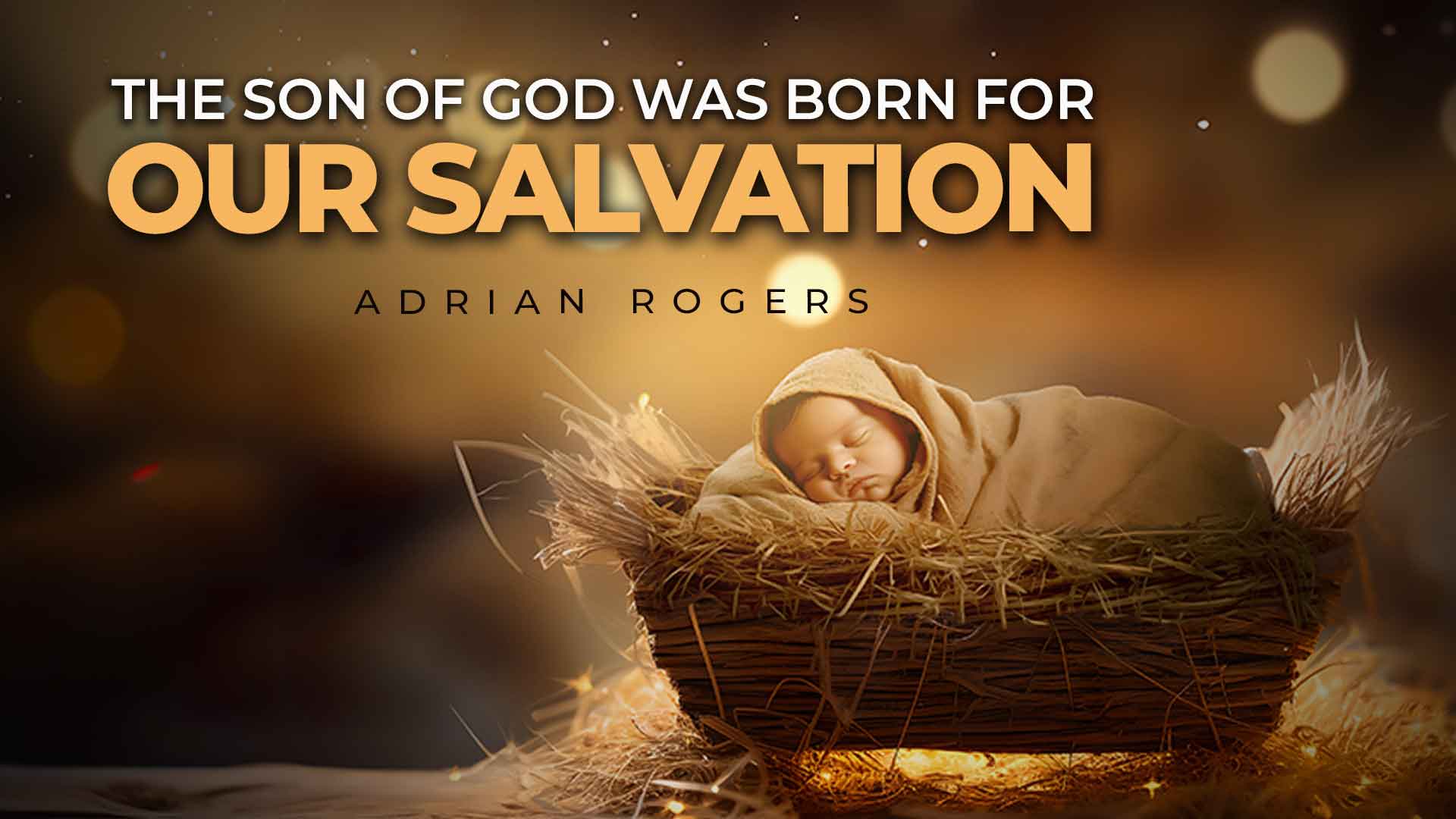
Read more about the hope we have in Jesus in the article, “The Son of God was Born for Our Salvation.”
Jesus was born in Bethlehem, but His existence did not begin in Bethlehem; He has been from everlasting. The Book of Micah offers us a clear picture of Christmas to come in the Old Testament.
But you, Bethlehem Ephrathah, though you are little among the thousands of Judah, yet out of you shall come forth to Me the One to be Ruler in Israel, whose goings forth are from of old, from everlasting (Micah 5:2).
All of the prophecies about the Messiah in the Old Testament are fulfilled by Jesus of Nazareth.
“Without the Lord Jesus,” Adrian Rogers said, “the Old Testament is simply a bundle of unfulfilled prophecies, of unexplained ceremonies, of unattainable laws” Jesus is the key to understanding the Old Testament.
Portraits of Jesus in the Old Testament
Jesus is who all the Old Testament prophets have given witness to. He is portrayed as the Prophet, Priest, and King of every story from Genesis to Malachi. He is in every ceremony, and even in the design of biblical architecture such as the Tabernacle and the Ark of the Covenant. When we read the New Testament, we find the fulfillment of these Old Testament portraits in the person of Jesus Christ; He is the absolute and perfect likeness of the long-awaited Messiah.
In Luke 24:44, Jesus says,
“These are the words which I spoke to you while I was still with you, that all things must be fulfilled which were written in the Law of Moses and the Prophets and the Psalms concerning Me.”
Prophecies of Jesus in the Old Testament
There are more than 300 prophecies concerning the Messiah in the Old Testament. Throughout the Books of Law and Prophecy, God narrows the focus to a specific man from the nation of Israel. He would come from the Tribe of Judah, specifically the family of Jesse, and the household of David. He would be born of a virgin in Bethlehem, betrayed for 30 pieces of silver, crucified, and then raised from the dead.
Jesus fulfilled each of these prophecies, and many more. Mathematically, when we speak of the laws of probability, there is no doubt He is the Messiah. This truth does not go against reason; it goes beyond reason to miracle. If a miracle could ever be mathematically calculated, the birth of Jesus would be the miracle of miracles.
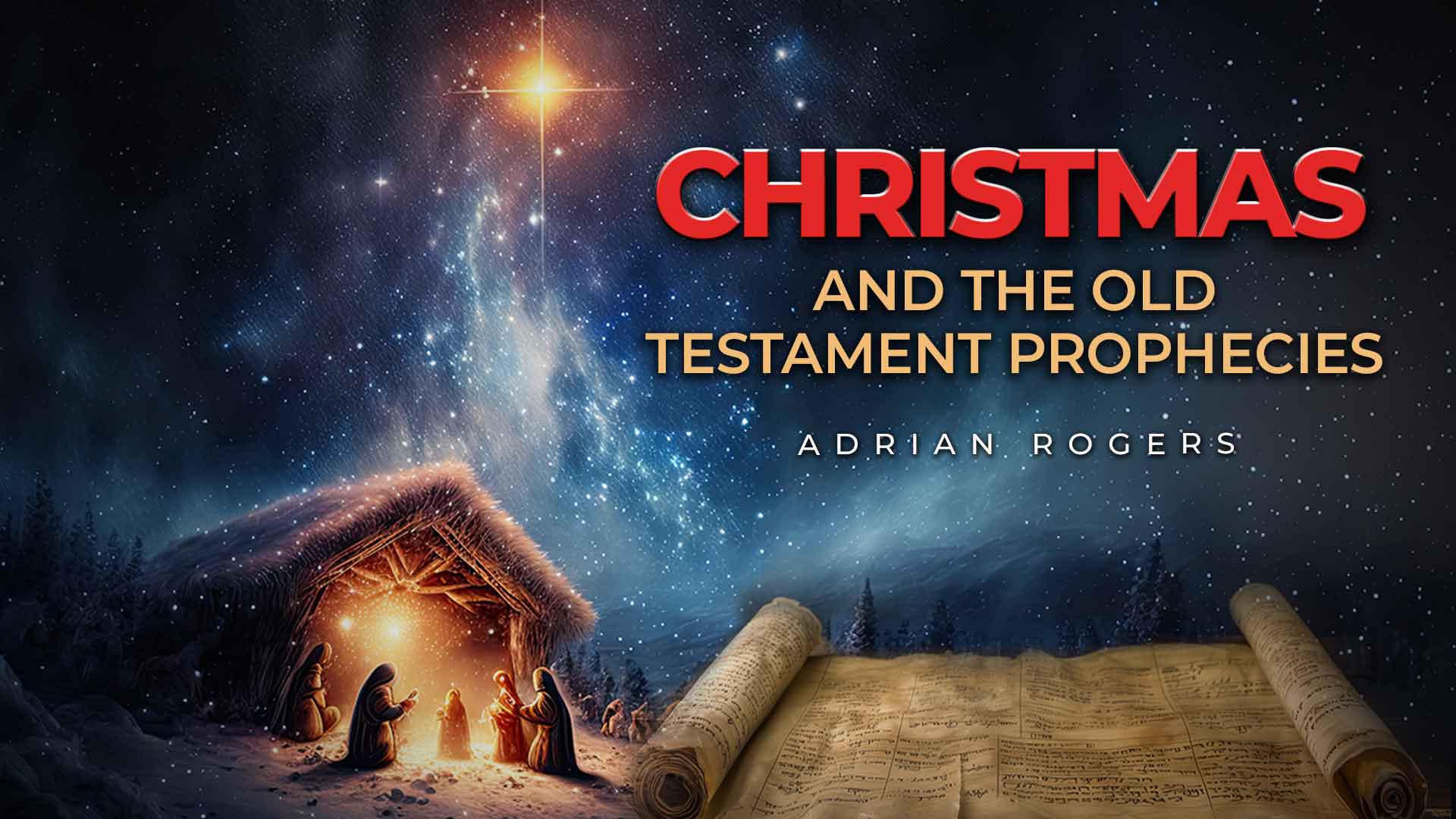
Read more about the fulfillment of Messianic prophecy in the person of Jesus in the article, “Christmas and the Old Testament Prophecies.”
Read about how the design of the Old Testament Tabernacle points to the Messiah in the book, “Seeing Jesus in Unexpected Places.”
Jesus Christ is the Son of God, and the Trinity is evident in the story of Christmas.
And the angel answered and said to her, “The Holy Spirit will come upon you, and the power of the Highest will overshadow you; therefore, also, that Holy One who is to be born will be called the Son of God” (Luke 1:35).
The doctrine of the Trinity is what makes our faith different from all other faiths. We can’t understand the Trinity through science or logic. Our minds are finite; God’s intellect, wisdom, and understanding are infinite.
Adrian Rogers said, “I wouldn’t have any confidence in a God I could understand.”
The only way we can know about the Holy Trinity is by divine revelation, which He has given us in His Word. We see the Trinity clearly revealed in the first Book of the Old Testament, Genesis, and in the first chapter of John in the New Testament.
And the Spirit of God was hovering over the face of the waters (Genesis 1:2b).
Then God said, “Let Us make man in Our image, according to Our likeness” (Genesis 1:26a).
In the beginning was the Word, and the Word was with God, and the Word was God. He was in the beginning with God. All things were made through Him, and without Him nothing was made that was made (John 1:1-3).
God has a triune nature. He is one God in three persons. You can recognize those persons in the Scriptures above. The Spirit of God in Genesis 1:2b is God the Holy Spirit. The God speaking in Genesis 1:26a is God the Father. The Word who was with God in the beginning in John 1:1-3 is God the Son.
The Trinity, together, created the world, composed the Scriptures, conceived the Christ, and commissioned the Church.
While we can’t fully understand the Trinity, God’s nature is reflected in the order He established for this world.
Space consists of height, width, and depth. You can’t have one without the other. Time is divided into past, present, and future. You can’t have one without the other. Time is triune. Space is triune. Man is triune. We’re made in the image of God—body, soul, and spirit. The soul consists of the mind, will, and emotions; the spirit is unique to Man and is the part of nature through which we can know God.
Through the Holy Trinity, we have our salvation. Salvation has been in the heart and mind of God before we were ever born. The Father thought it, the Son bought it, and the Holy Spirit wrought it.
Adrian Rogers says, “You have been selected by the Father, saved by the Son, and sealed by the Spirit.”
Because of the mystery of the manger, the blessing of Bethlehem, and the treasures of the Trinity, we can never lose our salvation.
The Trinity is undeniable in the miraculous story of Christmas.
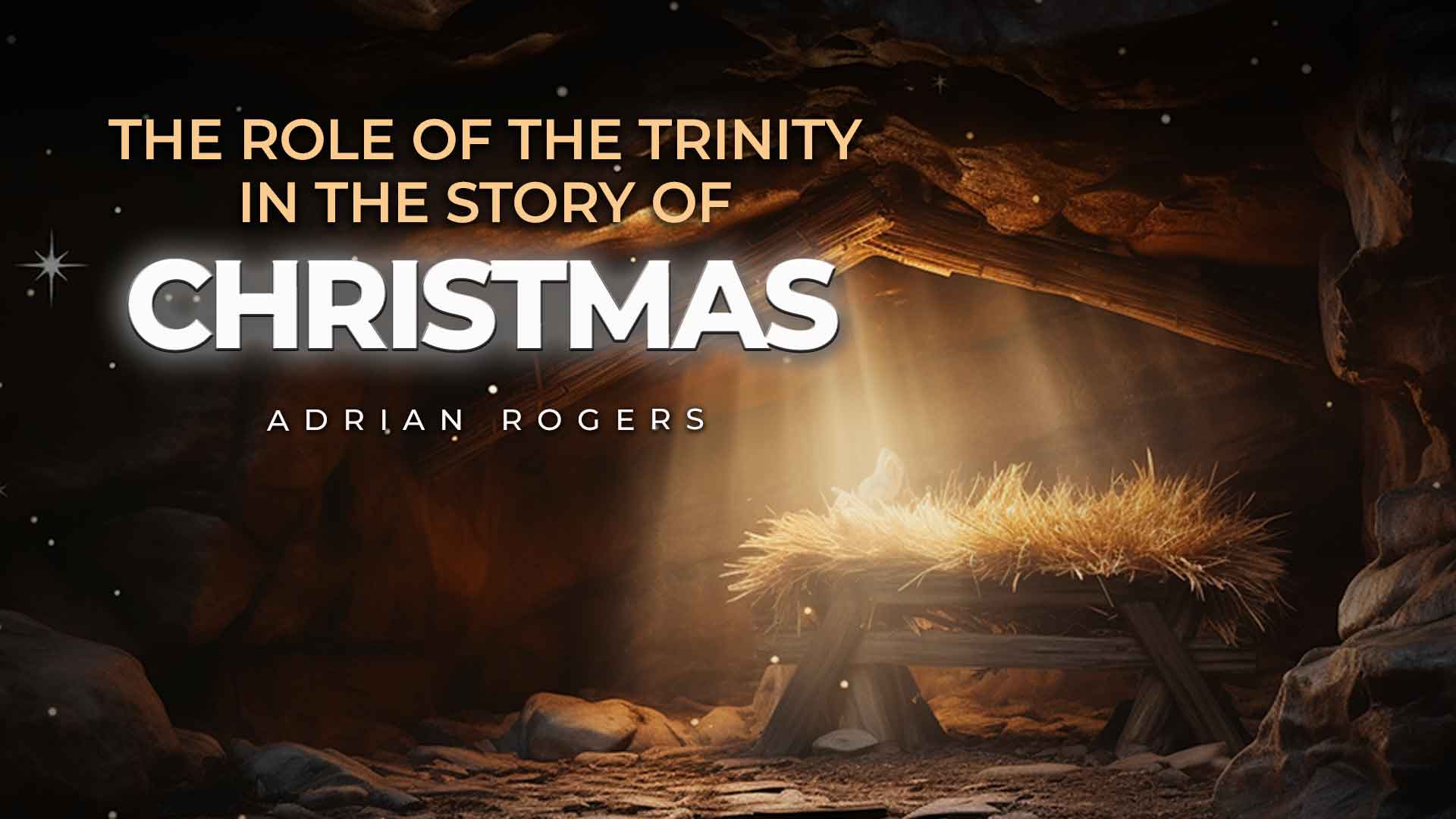
Read more about the Trinity in the article, “The Role of the Trinity in the Story of Christmas.”
Do you have profound questions about God? Get the book, “Timeless Truth, Reconciliation with God.”
One of the most quoted Scriptures at Christmas comes from the Book of Isaiah, written about 700 years before the birth of Jesus. The prophet said:
For unto us a Child is born, unto us a Son is given; and the government will be upon His shoulder. And His name will be called Wonderful, Counselor, Mighty God, Everlasting Father, Prince of Peace.
The baby of Bethlehem was not an ordinary child. Jesus is not part-God, part-man; He is fully God in human flesh and there has never been nor will there ever be another like Him. The Bible clearly and plainly states that He was born of a virgin, but His beginning was not at Bethlehem. There was never a time when Jesus was not, and there will never be a time when Jesus is not. He is everlasting, forever God.
The Prophet Isaiah also told us Jesus is the Sovereign, the King whose government will never end.
Of the increase of His government and peace there will be no end, upon the throne of David and over His kingdom, to order it and establish it with judgment and justice from that time forward, even forever (Isaiah 9:7).
Jesus’ is Wonderful. If our spiritual eyes will see it, the wonder of Christmas can be ours every day of the year.
There is wisdom in His name. He is our Counselor. We need only ask and He will guide and advise us through every valley and up every mountainside.
There is power in His name. Jesus is The Mighty God, the one who reigns forever, the one strong enough to uphold you in your darkest hour.
There is worship in His name. He is The Everlasting Father. He alone is worthy of worship.
There is rest in His name; He is the Prince of Peace, the only One who can satisfy the yearning for peace in our hearts.
These names will stand for eternity, along with the other names by which we recognize our Savior—the Redeemer, the One and Only, the living Word, the One whose miracle birth we celebrate at Christmas.
His name is the reason we can know real joy, true peace, and lasting hope.
He is Jesus, the Name above all Names.
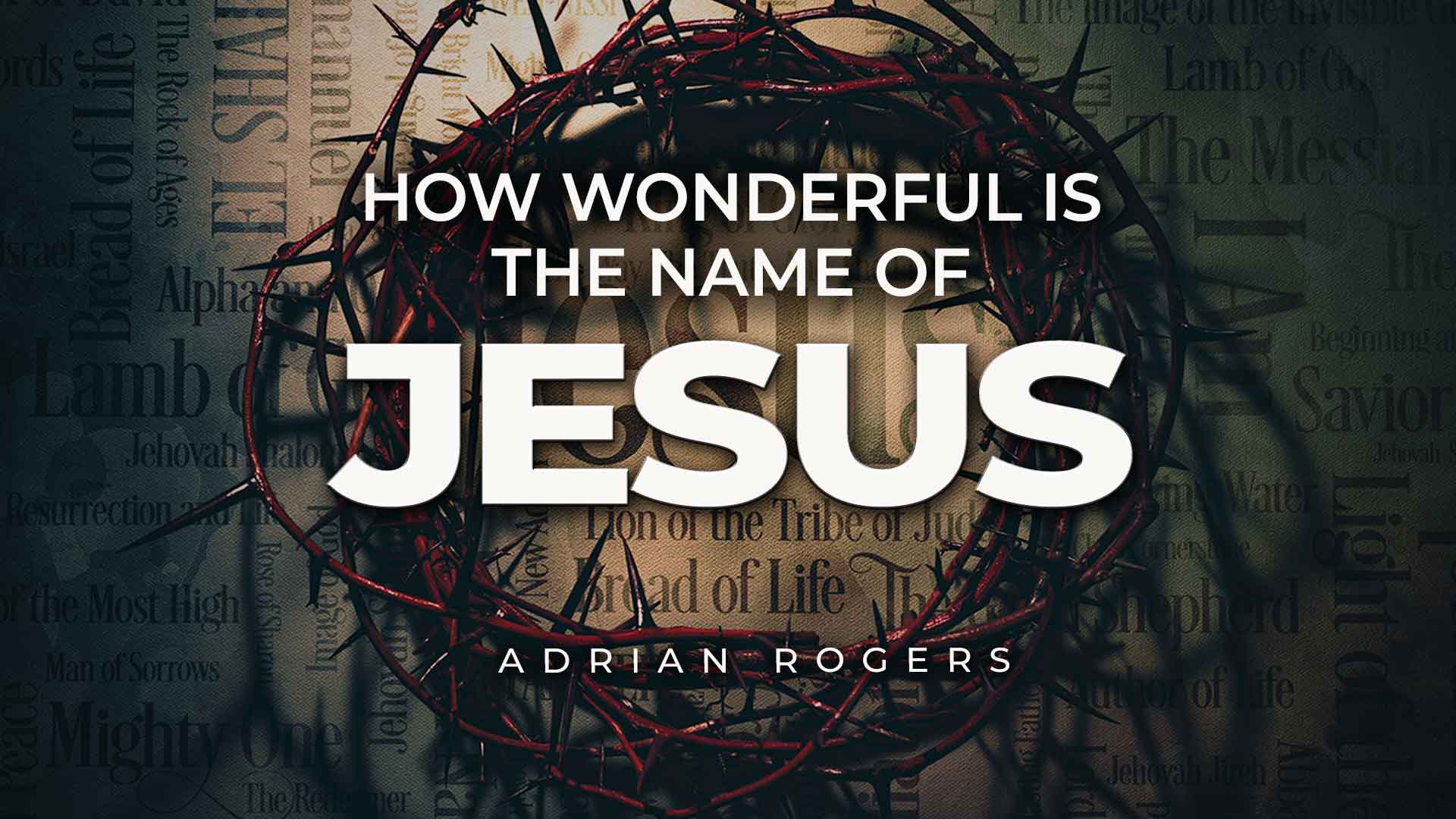
For more about the names of Jesus, read the article, “How Wonderful is the Name of Jesus.”
Get the "Names of God advent ornament set" from Love Worth Finding. These beautifully illustrated ornaments—one for each day December 1-25—can be hung on a tree or clipped onto a ribbon or banner in your home.